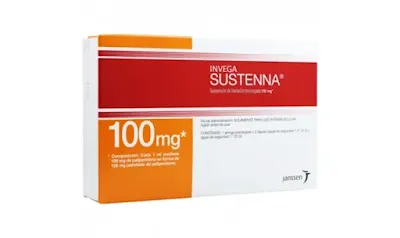The decision to commence or cease medication warrants a deep dive into the science behind the drug, as such choices should never be made lightly. We endeavor to equip readers with the necessary tools to make informed decisions about their treatment, ensuring a robust grasp of Invega's impact on both health and daily life.
.webp) |
| How Long Does Invega Stay in Your System |
What is Invega?
Invega, prominently known by its active ingredient, paliperidone, emerges as a powerful ally in the battle against mental health conditions such as schizophrenia and bipolar disorder. As an antipsychotic medication, its therapeutic prowess is encapsulated in various forms – oral tablets, intramuscular injections (including Invega Sustenna and Invega Trinza), and extended-release preparations, catering to the nuanced needs of patients and the precision of their treatment plans.Delving into its mechanism, Invega operates by fine-tuning the delicate symphony of neurotransmitters within the brain, restoring harmony to thought processes disrupted by psychosis. The clinical sophistication of Invega doesn't end there. Its extended-release formulations, such as paliperidone palmitate, ensure a sustained release of the active drug into the system, providing a stable therapeutic effect and potentially improving medication adherence among individuals navigating the complexities of psychiatric conditions.
How Long Does Invega Stay in Your System?
Understanding the drug removal timeline of Invega, also known as paliperidone extended release, is crucial for healthcare providers and patients. The duration Invega remains in your system is influenced by various factors, including the dosage, form of the medication (tablet, injection, or extended-release), and individual metabolism levels. Paliperidone is metabolized by the liver and excreted by the kidneys, and these processes can vary among individuals.- The half-life of Invega is approximately 23 hours in healthy adults, which means it can take about five days for the drug to reduce to negligible levels in the bloodstream.
- However, for long-term antipsychotic treatment, it may take several days to a couple of weeks or even months for the drug effects to completely dissipate after discontinuation.
- Factors such as age, with older adults or elderly patients potentially taking longer to eliminate the drug, can also play a role in the drug removal process.
Uses of Invega
Invega, with its active component paliperidone, emerges as a beacon of hope for individuals grappling with schizophrenia and bipolar disorder. This antipsychotic drug is engineered to restore balance within the brain's neurotransmitters, offering respite from the tumultuous waves of psychotic symptoms. Its therapeutic prowess is not limited to these conditions, as Invega has also found application in the management of schizoaffective disorder, showcasing versatility in the realm of psychiatric medications.- The recommended dosage of Invega varies, tailored to meet the unique symphony of an individual's condition, be it the haunting echoes of schizophrenia or the fluctuating tempos of bipolar disorder.
- Additionally, the medication can be prescribed off-label for other mental health disorders, a testament to its adaptability in psychiatric care.
Whether it's the immediate-release Invega tablets or the enduring melody of Invega Sustena and Invega Hafyera injections, medical professionals curate a symphony of treatment plans. They ensure the best treatment for patients, considering the drug's harmonious or discordant interactions with certain medical conditions and various other factors.
 |
| How Long Does Invega Stay in Your System |
Potential Side Effects of Invega
When unraveling the tapestry of antipsychotic drugs like Invega, it's crucial to acknowledge the potential side effects that accompany its benefits. Invega, known for its utility in managing schizophrenia and bipolar disorder, is not without its drawbacks. Common adverse effects can include symptoms such as:- Muscle rigidity, which may manifest as unyielding muscle tension,
- Abnormal movements, often experienced as involuntary muscle contractions or tremors, and
- Weight gain, a side effect that can have additional health implications for certain people.
Withdrawal from Invega
Stepping down from Invega isn't a walk in the park; it's a journey that requires caution and the careful guidance of a healthcare professional. Withdrawal symptoms can be a real concern for those who decide to discontinue their regimen. It's similar to a seasoned conductor stepping off the podium – the orchestra of neurotransmitters may falter without their leader, resulting in a cacophony of withdrawal symptoms. Patients might face a multitude of reactions, from the physical to the psychological, each one unique to the individual's body chemistry and history of drug use.It's crucial to understand that invega withdrawal isn't about abrupt endings; it's about gentle releases. Tapering off this prescription drug under medical supervision isn’t just recommended, it's essential. This process ensures that the body has adequate time to adjust, reducing the shock to the system and mitigating the severity of withdrawal symptoms.
- Decreased dosage gradually over time
- Monitoring by a healthcare professional
- Personalized withdrawal plans
Conclusion
How long does invega stay in your system? Embarking on a journey with Invega (paliperidone) requires a deep understanding of its mechanics, from the conditions it aims to ameliorate to the potential hurdles upon cessation. We've navigated through the labyrinth of uses, from managing schizophrenia and bipolar disorder to possible off-label applications. We've scrutinized the side effects, separating the mild from the severe, and underscored the critical nature of medical guidance when facing the specter of withdrawal symptoms.Indeed, every medication leaves its own unique footprint – Invega is no different. The average time it lingers in the system is not merely a number but a reflection of individuality, affected by dosage, metabolic rate, and more. Our discussion on the drug's half-life has illuminated the layers that influence How long does Invega stay in your system?.
Whether you're a healthcare professional or someone personally impacted by these conditions, the essence of this discourse is to arm you with knowledge. A prescription drug like Invega is a powerful ally, but it demands respect and understanding. Always remember – your physician is your co-pilot on this voyage, offering personalized advice and support tailored to your story.

